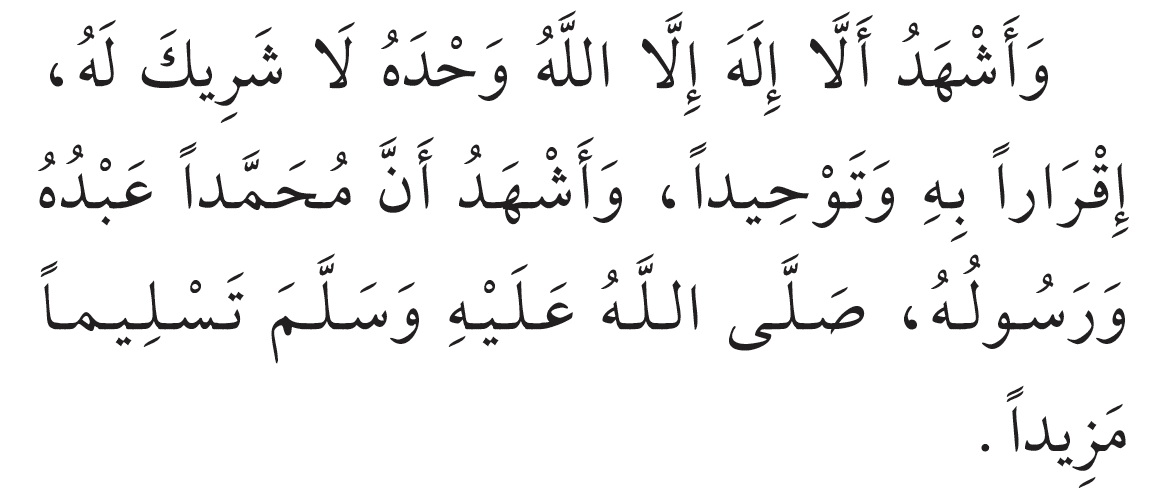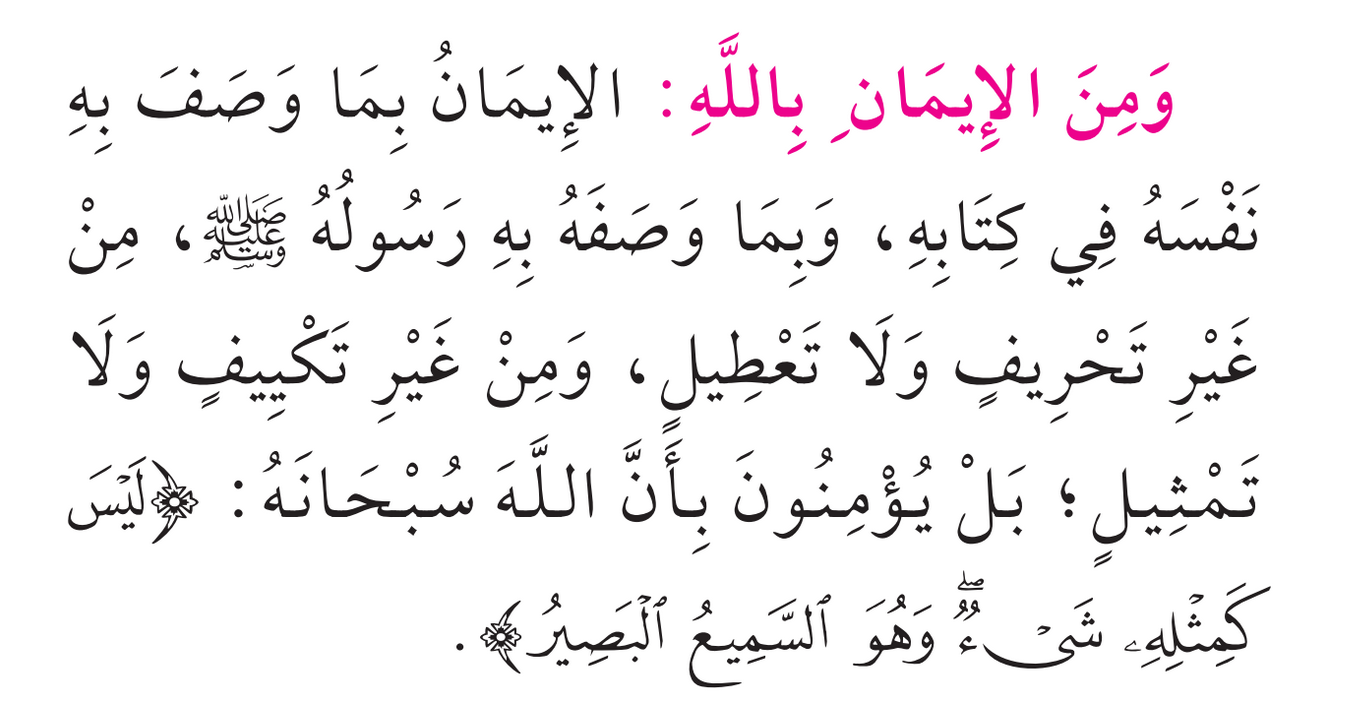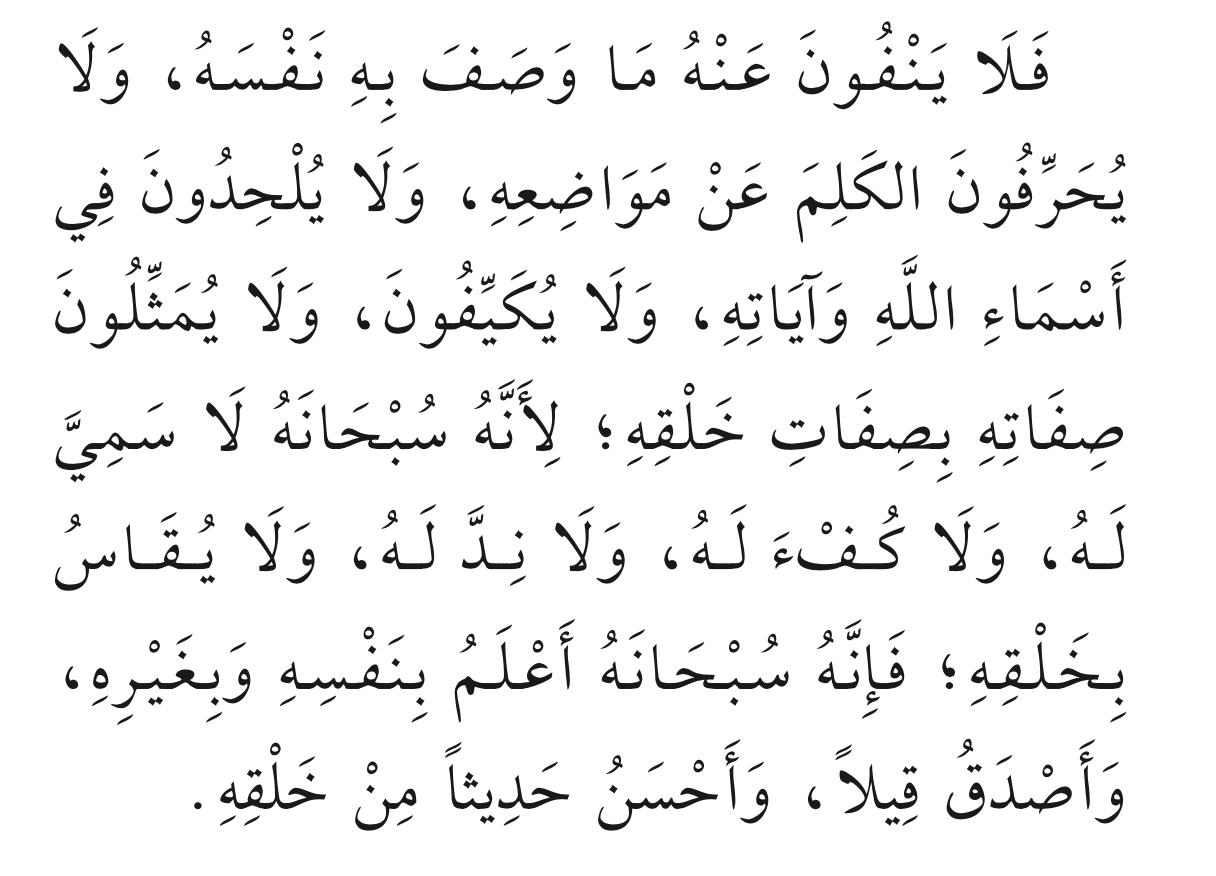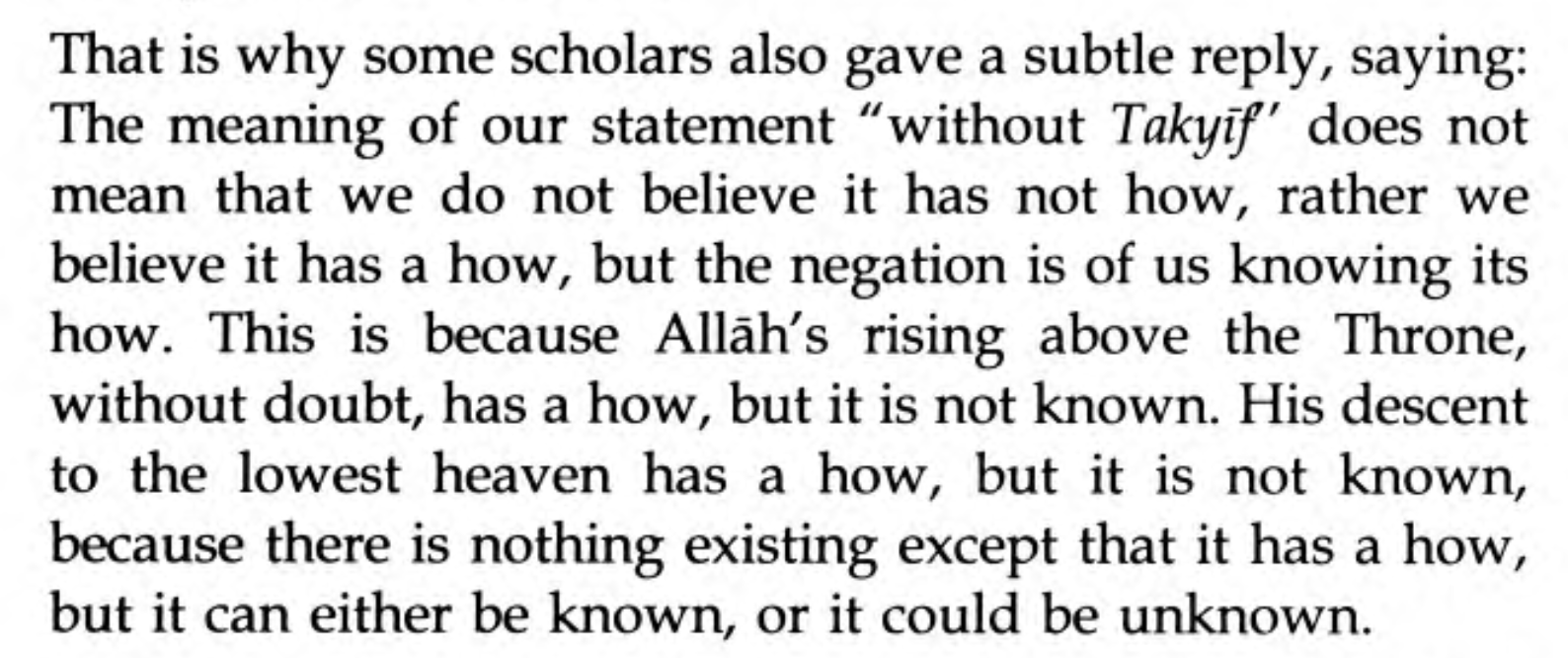Introduction
Created: January 21, 2021 5:11 AM
Muqaddimah
Bismillah, Alhamdulillah, Mention of Messengers, Praise for the Religion

”In the name of Allah, the Beneficent, the Merciful. All praise is due to Allah who sent His Messenger with guidance and the religion of truth for it to be supreme.”
- Bismillahirrahmanirrahim
- Almost every Islamic book begins with the basmalah.
- The ‘ba’ here means Astainu bika ya Allah (I seek your help O Allah)
- Bismillah is you are seeking Allah’s help through the barakah in mentioning (all) Allah’s name.
- Three are mentioned directly
1. Allah : The greatest name of Allah, Dzul Uloohiyah which means ‘The One Deserving of Al-Uloohiyah’ (being worshipped alone). All the other names of Allah are found within the name ‘Allah’.
2. Ar-Rahman : Most Merciful
3. Ar-Rahim : The Bestower of Mercy → Allah gives his mercy to whomsoever He wills. He reserved the majority of it for the believers on the day of judgement.
Ar-Rahman & Ar-Rahim both came from the attribute of Rahmah (mercy)
- Authors starts their books with the basmalah following the example of the Qur’an and the sunnah of the Prophet Salallahualaihiwassalam.
- Each chapter even starts with bismillahirrahmanirrahim with the exception of At-Tawbah. The ayah regarding the letter from prophet Sulaiman begins with bismillah also. This tells that the basmallah is the sunnah of all prophet.
- The Prophet Salallahualaihiwassalam would always begin his letters that he sent out to emperors and kings or any kind of ruler he dealt with, with bismillah.
- Worth noting that there are 2 separate wordings
1. When eating say ‘Bismillah’
2. When writing letters or books say the full sentence ‘Bismillahirrahmanirrahim’
- Alhamdulillah
- The praise to Allah. This is also based on the Qur’an and Sunnah.
- Allah started out the Qur’an with Alhamdulillah after Bismillah.
- The Prophet would start his speeh or khutbah with Alhamdulillah.
Ex : “Innalhamdalillah…”
- The difference between (general) praise & hamd
- What makes hamd for Allah only is the love and the veneration and the honour that you have for Allah.
- Ibn Taymiyyah said “Just mentioning the good thing about someone else is just a general praise, but hamd is to praise with complete love and veneration and honour.”
- The word ‘Al’ in Alhamdulillah means ‘All’, all praise, all types of praise. So why does Allah deserve all types of praise? It’s because Allah has Al-Asmaul Husna, Asma Was Sifaat, the perfect names, attributes, and actions nobody has but Him.
- Mention the Messengers
Shaykh Ustaimin mentioned that the word messenger here is not restricted to Messenger Muhammad only but encompasses all the messengers Allah has sent, but of course our Prophet Muhamamd is the most complete example of this.
- Guidance & Religion of Truth
- Guidance (huda) here means beneficial knowledge and the religion of truth (deenul haqq) is righteous actions. Every prophet was sent down with these 2 things.
- The religion of Islam is sent to be supreme/dominant to overpower, overcome, to subjugate. That’s why Islam is not a choice, it is the only choice, as it is the only religion Allah is pleased with.
Iqrar & Salwat

”I testify that there is no deity worthy of worship except Allah alone and he has no partners in attestation to His monotheism. And I testify that Muhammad is His servant and Messenger. May Allah shower His blessing upon him and his household and provide him abundant peace.”
- Asyhadu
- Means ‘I bear witness’. This is mentioned in the Qur’an :
3-18
شَهِدَ ٱللَّهُ أَنَّهُۥ لَآ إِلَٰهَ إِلَّا هُوَ وَٱلۡمَلَـٰٓئِكَةُ وَأُوْلُواْ ٱلۡعِلۡمِ قَآئِمَۢا بِٱلۡقِسۡطِۚ لَآ إِلَٰهَ إِلَّا هُوَ ٱلۡعَزِيزُ ٱلۡحَكِيمُ
Allah witnesses that there is no deity except Him, and [so do] the angels and those of knowledge - [that He is] maintaining [creation] in justice. There is no deity except Him, the Exalted in Might, the Wise
Link to original
- Look at whose witness Allah gives weights to:
- Himself
- Angels
- The people of knowledge. This is part of the virtue of the people of knowlede.
- The terminology entails :
1. Knowledge → you can’t bear witness of something you are ignorant of
2. Certainty → you have to be sure
3. Truthfullness → you can’t lie
4. Sincerity → you have to have ikhlas
- Asyhadu also means ‘I believe’ or ‘I confirm’
- Comes with conditions. It is not just a word/phrase that is said without meaning. Just saying it is not enought. It is saying it along with its conditions.
- What is it that you testify to? Is explained with the next words;
- aLaa Ilaaha Ilalllah
- ‘Sullam Al-Usool..’
- The conditions of Laa Ilaaha Ilallah. More here.
1. Ilm / Knowledge / الْعِلْمُ
2. Yaqeen / Certainty / ليَقِينُ
3. Qabul / Acceptance / القُبُولُ
4. Inqiyad / Submission / الإِنْقِيَادُ
5. Saddiq / Truthfullness / لصِّدْقُ
6. Ikhlas / Sincerity / الإِخْلَاصُ
7. Mahabbah / Love / المَحَبَّةُ
8. Disbelieving / Disassociation in / with Taghut (Polytheism) / الكُفرُ بِالطَّاغُوتِ
- The word ‘Illah’ is Al-Ma’bud → the one who is worshipped.
> “And ask those We sent before you of Our messengers; have We made besides the Most Merciful deities to be worshipped?”
- QS Az-Zukhruf (43:45)
- When we translate ‘Laa Ilaaha Ilallah’ it directly means ‘There is nothing that is worshipped except Allah’. However it is factually incorrect as there are many people who worship other than Allah. Therefore, the scholars said that there is a common understanding in the meanig, a hidden word ‘bil haqq’ which is ‘There is no God deserving of worship/worthy of worship/truthfully worshipped/worshipped in truth other than Allah’.
Remember : An-Nafi (Negating (anything that is worshipped besides Allah)) & Isbat (Affirming (the worship of Allah alone).
- Wahdahu La Syarikala
- ‘Alone and with no partner’ is an emphasis on the previous word.
- ‘Laa Syarikala’ goes with ‘Laa Ilahaa’ while
Laa Syarikala → there is no partner with him
Laa Ilahahaa → there is no God
- ‘Wahdahu’ goes with ‘Ilallah’
Wahdahu → alone
Ilallah → but Allah
- Iqraran bihi wat tawheeda
Iqrar → shahadah, declaring. This emphasize the ‘asyhadu’
Wa Tawheeda → saying that this statement is my declaration of tawheed
Tawheed
- Linguistically
The word ‘tawheed’ is a verbal noun which comes from the verb ‘wahada yu wahidu’ wich means ‘to make something one’ or ‘to affirm something to be one’. These words was used by the prophet and the sahabah. Reference :
Hadith when the prophet sent Mu’adh ibn Jabal to Yemen.

- Islamically
Tawheed can be divided into 3 or 2.
If it’s divided into 3, the breakdown becomes like this :
-
Tawhed Ar-Ruboobiyyah → The oneness of Allah in His Lordship
Actions that are unique to Allah, only He is capable of doing.
-
Tawheed Al-Uloohiyah / Al-Ilahiyyah → The oneness of Allah in His Worship / Divinity.
Our actions towards Allah.
-
Tawheed Asma Was Sifaat → The oneness of Allah in His Names and Attributes
From among the early scholars who used these terms was Imam Abu Hanifah.
If it’s divided into 2, the breakdown becomes like this :
Tawheed Ar-Ruboobiyyah + Asma Was Sifaat becomes :
- Tawheed Al Ma’rifati wal Isbat → The tawheed of knowing and affirming.
Because what is required from you as it relates to Allah’s lordship & as it relates to His names and attributes is to believe, to affirm, to know, and to confirm. It is primarily knowledge and affirmation.
And as for the tawheed of singling out Allah in worship it becomes
- Tawheed Al-Qasi wa Thalab → The tawheed of intentions and seeking out Allah through your actions.
What is required from you is the practice, the manifestation of the knowledge you have through amal that encompasses actions and intentions and seeking Allah through your worship.
Some scholars call them Tawheed of Ilm and Tawheed of Amal.
- Wa Asyhadu Anna Muuhammadan Abduhu Wa Rasuluhu
Here we encounter another statement of bearing witness. This is important to note because the first pillar of Islam is the Shahadahtain for without it you can’t be considered a muslim.
‘I bear witness that Muhammad (ibn Adullah), the slave of Allah and His Messenger’
The word ‘slave’ and ‘messenger’ is something that the Prophet himself told us to say.
Hadith from Umar

The second shahadah statment contains 2 principles :
1. Prophet Muhammad is an Abd, a slave of Allah, therefore he is not to be worshipped.
To say that the prophet is a slave is not degrading, rather it is the highest praise, evern Allah mentioned the Prophet as a slave in several places in the Qur’an.
2. Prophet Muhammad is a Messenger of Allah, therefore he is not to be disobeyed.
- We obey the commands of and stay away from the prohibitions from Messenger.
- We believe in what he told us regardless of what the science affirms.
- We only worship Allah the way he showed us to do it.
- Salallahu alaihi wa ala sallam Tasliman Mazidan
The salawat :
‘Salallahu alaihi’
When we say salam & salutations to the prophet, Allah also made His salam & salutations in the most lofty of gatherings of angels. The word ‘ahl’ whenever it is in the context of the prophet’s family is his muslim family and the sahabi means those who saw the prophet whilst they’re still alive & believed in him during his lifetime and they died believing him.
‘Wa ala’
Repeating this puts an emphais of ‘O Allah send your praise upon the Prophet AND his family and companions’
‘Wa salaman tasliman mazida’
The word ‘salaman’ means you are asking Allah for salaam for the prophet. Asking for Allah’s salaam (peace and security), keep him away from every deficiency, antything that would harm him, hurt his honour, anything that would hurt his honour & status. Here it means asking for an ‘even more increase in salam’, to keep the prophet safe and keeping him at peace.
The Rightly Guided Creed

”This is the creed of those upon the path of the saved and aided sect till the last hour (that is) AhlusSunnah wal Jama’ah”
- 2 takeaways :
- Islam will break down into sects
- None of whom will be saved except for this one
- Ibnu Taymiyyah got this from the hadith regarding the 73 sects
What does the prophet mean by the jews & christians who will be in paradise?
Those who follows the initial teaching that Prophet Musa and Prophet Isa came with which is Tawheed as we know that all prophet were sent down with that 1 grand message.
These 72 sects has deviated from what the Prophet taught. This is the importance of studying aqeedah. Aqeedah is your creed and you must protect it in order for it to stay aligned with what the Prophet taught.
The group who will be saved is the ‘Jamaah’ or ‘Ahlusunnah wal Jamaah’. These are the people who follow the Qur’an and the Sunnah according to the understanding of the companions and the early generations of the muslims (tabiin & tabiuttabiin).
Imaan

”It (creed) entails Iman (firm belief) in Allah, His angels, His books, His messengers, the Ressurection and the Destiny - the good of it and the evil of it.”
- The word imaan
- Linguistically
Is firm belief in something. Not in a general (tasdiq) sense. It is to believe in detail & hold on firmly to it.
QS Yusuf : ‘You will not have a firm belief even if we …’
Iman is not just tasdiq (believing something to be true) but firmly, having a convinction in that thing.
- Islamically
Some scholars divided Imaan into 2/3/5
- 2
1. Speech (Knowledge - At-Tawheed Al-Ilmi)
2. Action (Worship - At-Tawheed Al-Amali)
- 3
1. To say with your tongue
2. To believe with your heart
3. To act with your limbs
- 5
1. Statements of the heart → your beliefs, your aqeedah, it is a manifestation of what you holds in your heart.
2. Actions of the heart → the things that you do with your heart, for example : fearing Allah.
3. Statements of the tongue → the things that you say that relates to your beliefs, example: saying the shahadahtain.
4. Actions of the tongue → the things that you do with your tongue, example: dhikr, reciting the Qur’an, salaam.
5. Actions of the limbs → the things that you do with your body, example: going to Hajj.
When we say statements it means like a declaration of your beliefs, and when we say actions it means like the things you do that manifests those beliefs.
The deviants would take a way one of these points
Example : “it does not matter if I dont pray/ wear the hijab, my imaan is in my heart”
There is no doubt that only Allah knows what is in your heart, but you cannot take one from the other as your actions is the manifestation of what is within.
Evidences :
And the hadith about Jibreel the ‘O Muhammad tell me about Islam, Imaan, Ihsan..‘. Refer to the 40 hadith notes for more details.
- Imaan & Aqeedah
The sheikh equates imaan and aqeedah. The word imaan is used in the Quran & Sunnah widely, while aqeedah is a more modern terminology. Thus why he mentioned ‘Our aqeedah is … ’ the 6 pillars of iman.
Does the 6 pillars covers all aspect of aqeedah?
We don’t add to the religion, but there are points that has to be further clarified/highlighted in light of the deviancy that has sprung.
Example: The shia hates all the khalifas except Ali, even we can say they hate almost all the sahabah. Therefore we can highlight, we say, ‘To love the sahabah is our aqeedah’.
- The General & Specific Imaan
In regards to the pillars, it contains 2 things :
- The general imaan is the bare minimum a person has to know for them to be considered as muslims, and
- The specific imaan which is something that you acquire as time goes through knowledege.
- Needs Organizing & Re Listen
As shafat : 181 - 183
Subhana : Allah is free of flaws and imperfections and deficiencies.
3 meaning of Al Aziz
1. He doesnt need anyone else
2. Allah overpowers His creations. He has the most power.
3. Free from the description or attributes the ignorants give Allah.
And salaam is for the prophets.
The prophets are safe and protected from describing Allah from something incorrect. This lies in their knwoledege, their understamding, the way they convey, and the way their worshkp.
Benefit : if we want to be protected, we follow the prophet’s way of describing Allah.
Safety and protection is found in following the prophet.
there is no way for those who follow the sunnah to turn away from what the prophet has came with. because it is the siratal mustaqim.
In QS Surah An-Nisa 69 Allah describes those who are in the straight path is the one who are
> And whoever obeys Allah and the Messenger - those will be with the ones upon whom Allah has bestowed favor of the prophets, the steadfast affirmers of truth, the martyrs and the righteous. And excellent are those as companions.4-69
وَمَن يُطِعِ ٱللَّهَ وَٱلرَّسُولَ فَأُوْلَـٰٓئِكَ مَعَ ٱلَّذِينَ أَنۡعَمَ ٱللَّهُ عَلَيۡهِم مِّنَ ٱلنَّبِيِّـۧنَ وَٱلصِّدِّيقِينَ وَٱلشُّهَدَآءِ وَٱلصَّـٰلِحِينَۚ وَحَسُنَ أُوْلَـٰٓئِكَ رَفِيقٗا
And whoever obeys Allah and the Messenger - those will be with the ones upon whom Allah has bestowed favor of the prophets, the steadfast affirmers of truth, the martyrs and the righteous. And excellent are those as companions
Link to original
What it means when we talk about Allah’s names and attributes?
The quran & sunnah is full of joining negation and affirmation.
Affirmation : believe in the names & attributes & acting upon the knowledge of what we know.
Negation : take an extra step → affirming the perfect opposite.
Ex : ‘Your Lord does not oppress anybody.”
If we leave it at that, we haven’t affirm perfection of Allah. Therefore we affirm the perfect opposite. The opposite of oppression is justice. Therefore, we affirm the perfect justice for Allah.
Ahlusunnah take the perfect opposite of something negative.
Allah isn’t so he is. ←
---
Ayatul Kursi
The shaikh said :
Al Ikhlas
Imaan in Allah

”And from faith in Allah is the faith in what He describes Himself with in His Book, and what His Messenger Muhammad Salallahualaihiwassalam has described Him with."

"They do not negate what He describes Himself with, and they do not distort the words from their places. They do not engage in llhad concerning Allah’s Names and His Ayat. They do not engage in Takyif, nor likening His Attributes to attributes of His creation; because He, Glorious is He, is such that there is none similar to Him, and no co-equal to Him, and no rival for Him, and He, Glorious and Exalted is He, is not comparable to His creation. Because He is more knowledgeable about Himself and other than Him, and the most truthful in speech, and better at narrating than His creation.”
- Surah Al Ikhlas & The Attributes of Allah
Surah Al Ikhlas is worth 1/3 of the Qur’an and the meaning of the surah is to describe Allah’s attributes which is Al-Ahad/Al-Wahid and As-Samad.
Deviating Things Regarding the Understanding of the Names of Allah
- At-Tahrif (Distortion) Twisting or taking the meaning away from the original meaning. Ibn Taymiyyah here used the word Tahrif while some scholars use the word Tawil. The former is better to use is because the word Ta’wil does come with the meaning of Tahrif, however it also has a positive meaning. This word can also means Tafseer, and it can also mean the eventual outcome of something. On the other hand, the word Tahrif is always & is exclusively negative in the Qur’an.
2. At-Ta’til (Denial)
To negate it.
Some may negate it completely, but some may negate it by saying ‘we believe in the words but not the meaning.’
Different examples of Ta’til :
1. To deny
> “And when it is said to them, “Prostrate to the Most Merciful,” they say, “And what is the Most Merciful? Should we prostrate to that which you order us?” And it increases them in aversion.”
- QS Al - Furqan (25:60)
Transclude of 25-60
In this verse, the disbelievers deny the attribute of Allah that is ‘The Most Merciful’ or Ar-Rahman.
2. To negate
3. To strip away the name from the meaning
There is a group called the Jahmiyah, and they deny all the names of Allah and His attributes except existence. They trace their roots back to a man called Jahm ibn Safwan. One of their well-known misguided belief is the saying ‘Samiun Ila Sami, Basirun Ila Basr’ which translates to ‘We believe that Allah is All-Hearing but we don’t believe that He can hear, We believe that Allah is All-Seeing but we don’t believe that He can see.”
→ When you study the beliefs of Ahlul Bid’ah you will find a lot of things does not make sense.
3. At-Takyif (Saying How)
Comes from the Arabic word ‘kayifa?’, in other words, asking ‘how’. In this context means asking things like, ‘How does Allah see?‘.
> “And do not pursue that of which you have no knowledge. Indeed, the hearing, the sight and the heart - about all those [one] will be questioned.”
- QS Al - Isra (7:36)
Transclude of 7-36
A person came to Imam Malik and asked ‘How do Allah rise above His throne?’, then Imam Malik replied :
Al istiwau ghairu maj’hul → Allah rising is not unknown to us. We know what it means.
wal kayifu ghairu ma’qul → and how Allah does it can’t be understood by the (human) mind. Our intellect can’t reach the understanding. The word ‘rising’ can differ in meaning when applied to the creation, but Allah’s ‘rising’ is different from His creation therefore we cannot comprehend nor compare it.
wassualu anhu bid’ah → (iman in it is obligatory) and asking ‘how’ is innovation (bid’ah).
Then Imam Malik asked for the man to be removed from his gathering since he believed the man is an innovator.

Evidence :
> “He cannot be questioned for His acts, but they will be questioned (for theirs). ”
- QS Al-Anbiya (21:23)
4. At-Tamsiyl (Likening/Comparison)
Some scholars used the word Tashbih which means ‘Resemblance’. The word ‘Tamsiyl’ as the sheikh used is more correct in meaning. Because when you say ‘Allah has a hand’, some of his creations also have a hand, which means a resemblance exists. But when you compare the hands of Allah and the hands of His creation, it is different.
- QS As-Shuraa (42:11)
Transclude of 42-11
- Allah established that there is nothing [remotely] comparable to Allah
- The word ‘Syaiun’ means everything
Why Allah says there is nothing remotely comparable to Him but then proceeds to attach the two attributes He has that His creators also have (i.e hearing & seeing)? The only way this ayah can be understood is because Allah’s sight is nothing like our sight. Allah’s knowledge is nothing like our knowledge.
This one ayah is sufficient to refute all the deviant beliefs about Allah’s names & attributes if you understand it properly.
Similar to the hands of the clock and the hands of a human. There is a similarity in meaning but we cannot say the two are alike. If the hands of creations (humans & clocks) are nothing alike, then how can we say our hands & Allah’s hands, the creator, is alike?
> “Lord of the heavens and the earth and whatever is between them - so worship Him and have patience for His worship. Do you know of any similarity to Him?”
- QS Maryam (19:65)
Transclude of 19-65
- The word ‘Samiyan’ means His names & attributes
> “Nor is there to Him any equivalent.”
- QS Al-Ikhlas (112:4)
112-4
👈 Prev | 👉
وَلَمۡ يَكُن لَّهُۥ كُفُوًا أَحَدُۢ
Nor is there to Him any equivalent
Link to original
- The word ‘Kufu’ means comparable/co-equal/similar/equivalent
> “So do not assert similarities to Allah. Indeed, Allah knows and you do not know.”
- QS An-Nahl (16:74)
- This ayah prohibits comparing Allah to anything
Again, this is because our intellect as humans cannot reach that knowledge. These ayah does not mean that you cannot say things like ‘See that woman, she’s generous but Allah is more generous.’ This is because you are saying Allah is far more superior than His creations which is true.
5. Al-Ilhad
Some scholars may divide it into 5 including Al-Ilhad. But generally, it’s the 4 mentioned above. Al-Ilhad almost encompasses all those 4.
It generally means to deviate from the right path (in this case, the names and attributes of Allah). So, those 4 is included in it’s meaning.
- Point from the Author
Allah knows Himself better. Therefore it’s not right for us to use our minds to think about Allah’s names & attributes when Allah is more knowledgeable about Himself. Even the prophet said “I cannot perfect my praise of You. You are as You praise Yourself.”
Because no one knows Allah better than Himself, and Allah is the Most Truthful in speech, and nobody can describe Him better than Himself, there is no doubt that we should take about Allah from what Allah has said about Himself, and from the Prophet who took it from Him as well.

”Then, His Messengers who are the truthful ones, those who were entrusted (Musdiiqun) unlike those who say about Allah what they know not.”